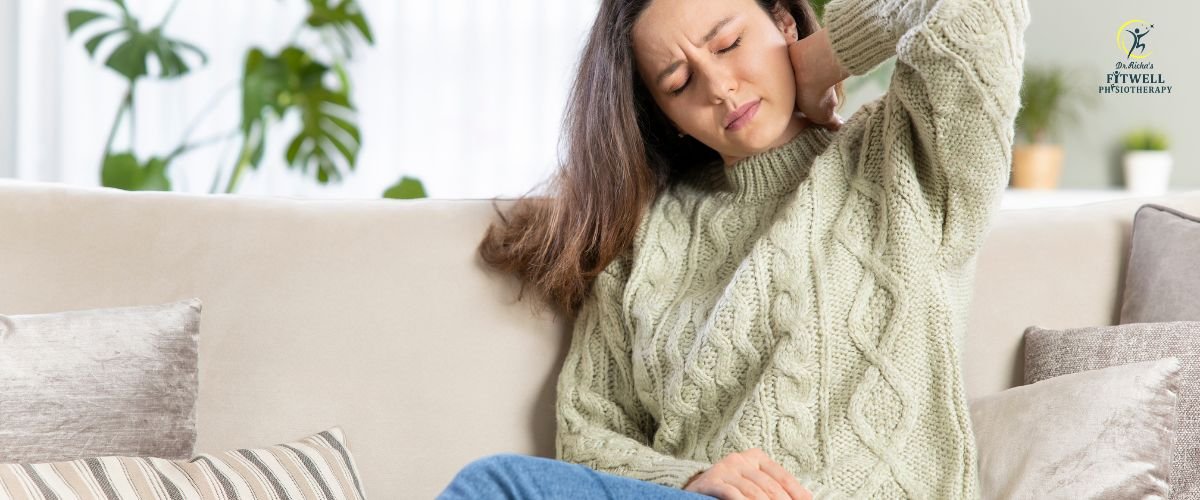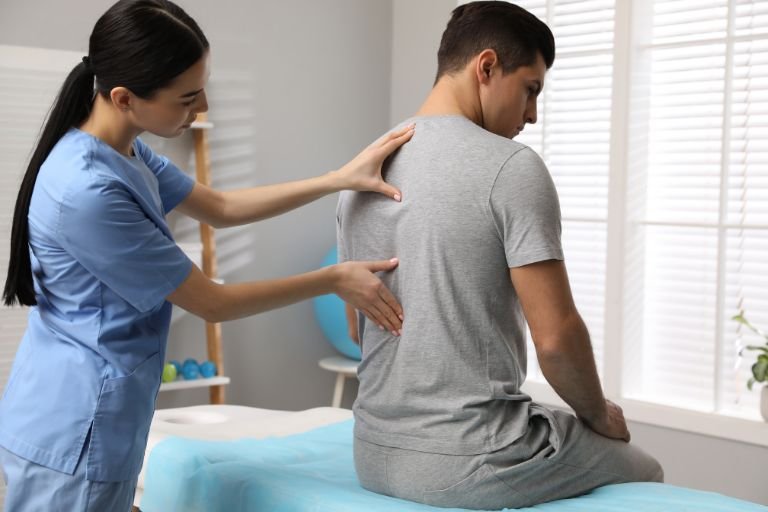- Fitwell Physiotherapy
Physiotherapy for Effective Muscle Stiffness

Physiotherapy can be highly effective in addressing muscle stiffness, whether it’s due to overuse, injury, poor posture, or underlying medical conditions such as arthritis or fibromyalgia. Muscle stiffness can lead to discomfort, reduced range of motion, and decreased functional ability, but physiotherapy interventions aim to alleviate stiffness, improve flexibility, and restore normal movement patterns through a variety of techniques and exercises.
Please submit your details below.
Key Components of Physiotherapy for Muscle Stiffness:
Assessment and Diagnosis: Physiotherapists conduct a comprehensive assessment to identify the underlying causes and contributing factors to muscle stiffness, including muscle imbalances, joint restrictions, posture abnormalities, and movement dysfunctions. They may use a combination of physical examination, range of motion testing, muscle palpation, and functional movement assessment to make an accurate diagnosis and develop an individualized treatment plan.
Manual Therapy: Manual therapy techniques, such as massage, joint mobilization, myofascial release, and trigger point therapy, are used to reduce muscle stiffness, alleviate pain, and improve tissue mobility. These hands-on techniques help release muscle tension, break down adhesions, and promote relaxation, allowing muscles to move more freely and comfortably.
Stretching and Flexibility Exercises: Stretching and flexibility exercises are essential components of physiotherapy for muscle stiffness, as they help elongate tight muscles, improve joint mobility, and restore normal range of motion. Physiotherapists prescribe specific stretching exercises tailored to target areas of stiffness and imbalance, incorporating both static and dynamic stretches to improve muscle flexibility and function.
Strengthening Exercises: Strengthening exercises are prescribed to address muscle weakness and imbalances that may contribute to muscle stiffness. Physiotherapists design individualized exercise programs that target weak muscle groups while avoiding exacerbating stiffness or pain. Progressive resistance training, functional exercises, and neuromuscular re-education techniques are used to improve muscle strength, stability, and coordination.
Postural Correction: Postural correction techniques focus on improving alignment, balance, and muscle activation patterns to reduce muscle stiffness and discomfort associated with poor posture. Physiotherapists assess posture, ergonomic factors, and movement patterns to identify areas of dysfunction and develop strategies for improving posture and body mechanics during daily activities.
Joint Mobilization and Manipulation: Joint mobilization and manipulation techniques are used to address joint stiffness and restrictions that may contribute to muscle stiffness and discomfort. Physiotherapists apply gentle, controlled movements to the affected joints to improve joint mobility, reduce pain, and restore normal joint function, allowing muscles to move more freely and comfortably.
Modalities: Modalities such as heat, cold, ultrasound, electrical stimulation, and therapeutic taping may be used as adjuncts to manual therapy and exercise therapy to relieve muscle stiffness, reduce pain, and promote tissue healing. These modalities can help relax muscles, improve circulation, and facilitate the effectiveness of other treatment interventions.
Education and Self-Management: Physiotherapists provide education on muscle anatomy and function, the importance of proper posture and body mechanics, and self-management strategies for addressing muscle stiffness at home. They teach individuals how to perform stretching exercises, ergonomic modifications, and relaxation techniques to alleviate stiffness, prevent recurrence, and promote long-term musculoskeletal health.
Benefits of Physiotherapy for Muscle Stiffness:
Improved Flexibility: Physiotherapy interventions help improve muscle flexibility, joint mobility, and range of motion, allowing individuals to move more freely and comfortably without stiffness or discomfort.
Reduced Pain and Discomfort: Physiotherapy techniques, such as manual therapy, stretching exercises, and modalities, help reduce muscle stiffness, alleviate pain, and promote relaxation, leading to greater comfort and well-being.
Enhanced Functional Ability: Physiotherapy programs improve overall functional ability, movement efficiency, and performance of daily activities by addressing muscle stiffness, improving flexibility, and restoring normal movement patterns.
Prevention of Injury: Physiotherapy helps prevent injuries by addressing underlying factors contributing to muscle stiffness, such as muscle imbalances, joint restrictions, and poor posture. By improving muscle flexibility, strength, and coordination, physiotherapy reduces the risk of future injuries and enhances musculoskeletal health.
Individualized Care and Support: Physiotherapists provide personalized care and support to individuals with muscle stiffness, addressing their unique needs, goals, and preferences. By developing tailored treatment plans and providing education, guidance, and encouragement, physiotherapists empower individuals to take control of their musculoskeletal health and well-being.
In summary, physiotherapy offers a comprehensive approach to addressing muscle stiffness, combining manual therapy, exercise therapy, modalities, education, and self-management strategies to alleviate stiffness, improve flexibility, and restore normal movement patterns. If you’re experiencing muscle stiffness, consider consulting a physiotherapist to explore treatment options and develop a personalized plan to address your specific needs and goals.
Frequently Asked Questions
Physiotherapy for muscle stiffness involves techniques to alleviate tension, improve flexibility, and restore normal muscle function. It aims to address the underlying causes of stiffness through targeted exercises, manual therapy, and stretching routines.
Muscle stiffness can result from various factors including overuse, poor posture, muscle imbalances, injury, stress, and medical conditions like arthritis or fibromyalgia.
Physiotherapy employs several methods:
- Stretching Exercises: To lengthen tight muscles and improve flexibility.
- Joint Mobilizations: Techniques to improve joint mobility and reduce stiffness.
- Soft Tissue Massage: Manual therapy to release tension and improve blood flow to stiff muscles.
- Heat Therapy: Application of heat to relax muscles and increase tissue elasticity.
- Therapeutic Exercises: Strengthening exercises to correct muscle imbalances and prevent future stiffness.
During the session, the physiotherapist will assess your range of motion, muscle strength, and areas of tension. They will then tailor a treatment plan based on your specific needs, which may include a combination of manual therapy, exercises, and modalities.
The timeline for improvement varies depending on the severity and cause of the stiffness, as well as individual factors such as adherence to the treatment plan and overall health. Some individuals may experience relief after a few sessions, while others may require more time and consistent effort to achieve significant improvement. Your physiotherapist will monitor your progress and adjust the treatment plan accordingly.
Related Treatments
How Fitwell Physiotherapy Can Help?
Dr. Richa’s Fitwell physiotherapy has an extensive team of physiotherapists all within their own specialist areas of physiotherapy. Whatever your condition, we guarantee that we will have the best physiotherapist for you. We assess, diagnose, plan, cure and care for you.
Fitwell Physiotherapy Clinic, Pune provides you best physiotherapy treatment in Kharadi, pune. We also serve Chandan Nagar, Vadgaon Sheri, Keshav Nagar, Wagholi & nearby Areas in Pune. We are experts in treating Neck Pain, Hand Pain, Back Pain, Lower Back Pain, Knee Pain, Stiff Neck, Sciatica, Arthritis, Stroke Paralysis & Post Surgical Rehab.
We provide Specialized physiotherapy treatments in Sports Injuries, Pre and post Surgery, Neurologic, Pediatric, Chronic Pain/Fatigue, Rheumatology, Women’s Health, Men’s Health, Ergonomics, Vestibular, Amputees & all sort of Pain treatment and lifestyle conditions.



























